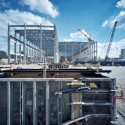 Yesterday was one of those days that reminded me of the value of visiting a site for a construction-related case to see and feel firsthand what is involved. Couldn’t I simply hire a photographer to take pictures of it for me instead? Perhaps, but that’s a poor substitute. It’s much more effective to tour the scene with the lead attorney and experts, as well as with our firm’s in-house architect to tap into his expertise about the building’s design and standard construction practices.
Yesterday was one of those days that reminded me of the value of visiting a site for a construction-related case to see and feel firsthand what is involved. Couldn’t I simply hire a photographer to take pictures of it for me instead? Perhaps, but that’s a poor substitute. It’s much more effective to tour the scene with the lead attorney and experts, as well as with our firm’s in-house architect to tap into his expertise about the building’s design and standard construction practices.
During my years of litigation, and equally so now in the field of litigation graphics, I became convinced of the importance of inspecting whatever items and locations that a case revolves around in order to visualize and then build a persuasive argument. As an attorney, it’s vital to inspect sites, accident scenes or any other type of location involving your client, and to use your eyes and other senses to become intimately familiar with the location and circumstances. Equally important is hiring experts and consultants who are willing to leave their desks for a site inspection too. This will help you individually and as a team develop your case as effectively as possible.
At Cogent Legal, our job of creating litigation graphics, and helping attorneys make their best case possible, involves simplifying complex information to make it more understandable and, ideally, to tell a compelling story about what happened. In construction cases (and often personal injury or product defect cases), it’s my experience that a case file ends up with hundreds, if not thousands, of photographs of whatever is allegedly defective or caused the accident. What tends to be missing from reams of photographs is a context that gives meaning to those images. A site inspection gives context and meaning to a case, ultimately aiding in the development of a better presentation that combines visual aids with oral and written arguments. (more…)

